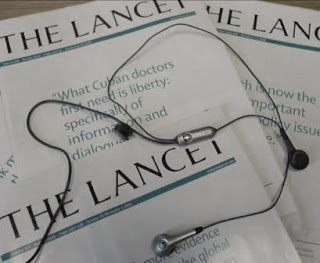By Stuart Rennie
Last week, the Lancet (subscription required) came out with a stinging editorial about certain actions by the World Health Organization and UNICEF. The journal has never been shy to offer judgments and pronouncements in its editorial section, but this time, there are very pointed accusations of dishonesty and betrayal of trust.
According to the editors, a Kenyan team of researchers conducted a successful program of using anti-malarial bed nets to reduce risk of dying in children, and submitted a paper about the program to the Lancet. Like any sophisticated study of any complicated health topic, the results came with the usual caveats, in term of study limitations and unanswered questions. But on August 16th, the WHO came out with a glowing press statement about the study without the caveats, flatly declaring that the findings “end the debate on how to deliver long-lasting insecticidal nets.” There is a backstory. The Kenyan researchers shared information about the study results to the WHO, on the understanding that the latter would treat this information as confidential until the results were published. But the WHO reneged on its promise, and issued its unnuanced (and baldly self-congratulatory) press release without even bothering to notify the researchers. Or the Lancet, for that matter, who obviously feel that they have been scooped. The editors rightly argue that when the data and interpretation of research on important health programs are complicated, statements from international health agencies should be issued at the same time as the study results are published, in order for readers to judge the health policy implications for themselves.
Perhaps even more troubling is the case involving UNICEF. There seems to be a market, so to speak, in child mortality figures. Who measures child mortality, how it is measured, and what the measures reveal is of no small interest to UNICEF, devoted as it is to the health, welfare and rights of children around the world. According to the Lancet editorial, UNICEF came to learn (via the Lancet itself) of a report the Lancet had accepted for publication showing disappointing results in the reduction of child mortality worldwide. Six days later, and months before it traditionally produces its annual report, UNICEF rounded up the press to advertise its claim that, according to its own figures, annual child mortality under the age of 5 had fallen under the 10 million mark for the first time in history. This time, the Lancet seems to feel more gutted than scooped: for what is the value of publishing a paper critical of child mortality reduction efforts when UNICEF has preemptively proclaimed its happy message?
The larger theme is the relationship between prestigious medical journals and influential health agencies. If those two examples are indicative of a trend, UN health agencies may be starting to regard the journals as an obstacle at worst, and a conduit of useful insider information at best. But if that sort of behavior keeps up, why should journals trust the research such agencies produce, and why should anyone trust their health policies and initiatives?
Stuart Rennie is a Research Assistant Professor in bioethics at UNC-Chapel Hill. He’s project manager for the NIH/Fogarty bioethics grant and ethics consultant for UNC-Gap projects in the Democratic Republic of Congo and Madagascar.
